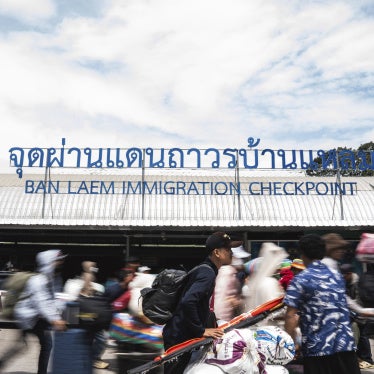Yang Jiechi
Minister of Foreign Affairs
Ministry of Foreign Affairs
No. 2, Chaoyangmen Nandajie,
Chaoyang District, Beijing, 100701
People’s Republic of China
Re: Forced Return of Kachin Refugees from Yunnan Province
Dear Foreign Minister Yang,
We write on behalf of Human Rights Watch, an independent, nongovernmental organization dedicated to the defense of human rights worldwide, to express our concerns regarding your government’s recent actions and statements with respect to ethnic Kachin refugees from Burma who have sought refuge in Yunnan Province in China.
As you may know, Human Rights Watch published a report in June 2012, “Isolated in Yunnan,” about the treatment of the estimated 7,000 to 10,000 refugees who had entered Yunnan Province since June 2011, fleeing the fighting in Kachin State. In that report, we commended the Chinese government for having generally allowed the refugees to enter China and remain in Yunnan. However, we also documented the unwillingness of your government to screen and register the new arrivals as refugees or to provide them with adequate food, shelter, and other humanitarian assistance. We also criticized the unwillingness of your government to allow representatives of the United Nations High Commissioner for Refugees (UNHCR) access to this population. Particularly given that virtually all of the Kachin whom we interviewed expressed a desire to return to Kachin State when it was safe to do so, and that most reported having been informally registered by Yunnan authorities, we recommended that your government provide humanitarian assistance, allow UNHCR access, and establish a temporary protection scheme.
We are therefore deeply concerned that the Chinese government, since mid-August, appears to have pursued precisely the opposite course of action.
Information from various reliable sources indicates that your government has forcibly returned at least 4,000 ethnic Kachin refugees to Burma. We are very concerned by your government’s assertion that these people are not refugees when your government has failed to establish or implement any procedure for screening asylum seekers and determining the validity of their claims to refugee status. Nor do the facts support claims by your government that the Kachin returned voluntarily to Kachin State. Notwithstanding the engagement of the Kachin Independence Organization (KIO) in facilitating the repatriation, the decision to return must be freely chosen by each individual refugee based on full information about conditions in the country of origin.
The 1951 Refugee Convention and the 1984 Convention against Torture and Other Cruel, Inhuman or Degrading Treatment or Punishment, both of which have been ratified by China, provide that refugees cannot be returned to a place where their lives or freedom would be threatened and that no person can be returned to a place where they would face the prospect of being tortured. This means that a person seeking asylum cannot be forcibly returned unless they have been determined not to face these risks by a fair and impartial refugee status determination (RSD) procedure. In countries such as China where no such procedure exists, governments normally allow UNHCR to carry out its mandate by performing refugee status determinations.
There has been no information that either the Chinese government or UNHCR has undertaken such a process. Thus there appears to be no basis for claims made by Chinese officials that the ethnic Kachin in Yunnan Province are not refugees and not deserving of protection inside China.
Finally, the Chinese government’s assertion that fighting in Kachin State is “subsiding” does not reflect the information on the ground. Residents and aid workers have told Human Rights Watch, and various news media have reported that the fighting between the Burmese army and the rebel Kachin Independence Army continues throughout contested areas of Kachin State, and that recent and intense clashes have displaced thousands more in areas surrounding Hpakant.
All the available information indicates that the Chinese government forcibly returned ethnic Kachin refugees to a conflict zone in violation of their rights under international law. Should China continue to deny a role for the UN refugee agency, it will need to promptly develop and implement its own refugee status determination procedures. It is crucial that the government adopt standards and practices consistent with international law. In the meantime, China needs to act in accordance with its international obligations, including by ensuring that future Kachin and other refugees are permitted into China, are provided adequate assistance, and are not deported without a proper refugee status determination.
We would be pleased to meet with you or the appropriate member of your staff to discuss these issues further.
Sincerely,
Sophie Richardson Bill Frelick
China Director Refugee Program Director







